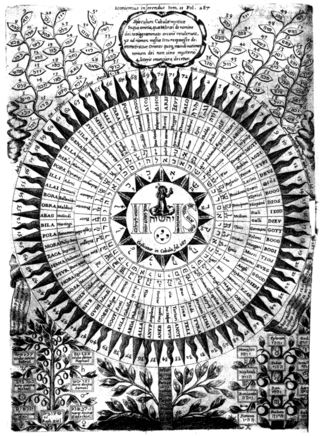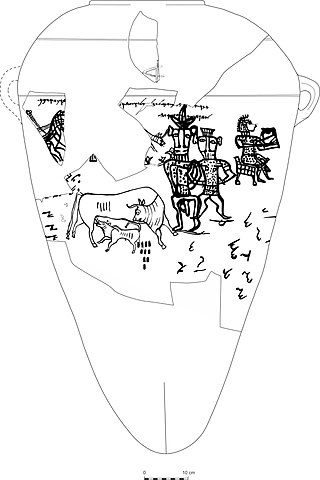Related Research Articles

The Torah is the compilation of the first five books of the Hebrew Bible, namely the books of Genesis, Exodus, Leviticus, Numbers and Deuteronomy. The Torah is known as the Pentateuch or the Five Books of Moses by Christians. It is also known as the Written Torah in Rabbinical Jewish tradition. If meant for liturgic purposes, it takes the form of a Torah scroll. If in bound book form, it is called Chumash, and is usually printed with the rabbinic commentaries.

Yahweh was an ancient Levantine deity, the national god of the Israelite kingdoms of Israel and Judah, and later the god of Judaism and its other descendant Abrahamic religions. Though no consensus exists regarding the deity's origins, scholars generally contend that Yahweh is associated with Seir, Edom, Paran and Teman, and later with Canaan. The origins of his worship reach at least to the early Iron Age, and likely to the Late Bronze Age, if not somewhat earlier.

Elohim, the plural of אֱלוֹהַּ, is a Hebrew word meaning "gods" or "godhood". Although the word is grammatically plural, in the Hebrew Bible it most often takes singular verbal or pronominal agreement and refers to a single deity, particularly the God of Israel. In other verses it refers to the singular gods of other nations or to deities in the plural.

Elephantine is an island on the Nile, forming part of the city of Aswan in Upper Egypt. The archaeological digs on the island became a World Heritage Site in 1979, along with other examples of Upper Egyptian architecture, as part of the "Nubian Monuments from Abu Simbel to Philae".

The Elephantine Papyri and Ostraca consist of thousands of documents from the Egyptian border fortresses of Elephantine and Aswan, which yielded hundreds of papyri and ostraca in hieratic and demotic Egyptian, Aramaic, Koine Greek, Latin and Coptic, spanning a period of 100 years in the 5th to 4th centuries BCE. The documents include letters and legal contracts from family and other archives, and are thus an invaluable source of knowledge for scholars of varied disciplines such as epistolography, law, society, religion, language and onomastics. The Elephantine documents include letters and legal contracts from family and other archives: divorce documents, the manumission of slaves, and other business. The dry soil of Upper Egypt preserved the documents.

There are various names of God, many of which enumerate the various qualities of a Supreme Being. The English word god is used by multiple religions as a noun to refer to different deities, or specifically to the Supreme Being, as denoted in English by the capitalized and uncapitalized terms God and god. Ancient cognate equivalents for the biblical Hebrew Elohim, one of the most common names of God in the Bible, include proto-Semitic El, biblical Aramaic Elah, and Arabic ilah. The personal or proper name for God in many of these languages may either be distinguished from such attributes, or homonymic. For example, in Judaism the tetragrammaton is sometimes related to the ancient Hebrew ehyeh. It is connected to the passage in Exodus 3:14 in which God gives his name as אֶהְיֶה אֲשֶׁר אֶהְיֶה, where the verb, translated most basically as "I am that I am" or "I shall be what I shall be", "I shall be what I am" In the Hebrew Bible, YHWH, the personal name of God, is revealed directly to Moses. Correlation between various theories and interpretation of the name of "the one God", used to signify a monotheistic or ultimate Supreme Being from which all other divine attributes derive, has been a subject of ecumenical discourse between Eastern and Western scholars for over two centuries. In Christian theology the word is considered a personal and a proper name of God. On the other hand, the names of God in a different tradition are sometimes referred to by symbols. The question whether divine names used by different religions are equivalent has been raised and analyzed.
Bethel, meaning 'House of El' or 'House of God' in Hebrew, Phoenician and Aramaic, was the name of a god or an aspect of a god in some ancient Middle Eastern texts dating to the Assyrian, Achaemenid, and Hellenistic periods. The term appears in the Torah and the Christian Bible, but opinions differ as to whether those references are to a god or to a place.
Idolatry in Judaism is prohibited. Judaism holds that idolatry is not limited to the worship of an idol itself, but also worship involving any artistic representations of God. The prohibition is epitomized by the first two "words" of the decalogue: I am the Lord thy God, Thou shalt have no other gods before me, and Thou shalt not make unto thee any graven image or any image in the sky, on earth or in the sea. These prohibitions are re-emphasized repeatedly by the later prophets, suggesting the ongoing appeal of Canaanite religion and syncretic assimilation to the ancient Israelites.
The Hebrew Bible makes reference to a number of covenants with God (YHWH). These include the Noahic Covenant set out in Genesis 9, which is decreed between God and all living creatures, as well as a number of more specific covenants with Abraham, the whole Israelite people, the Israelite priesthood, and the Davidic lineage of kings. In form and terminology, these covenants echo the kinds of treaty agreements existing in the surrounding ancient world.

Yehezkel Kaufmann was an Israeli philosopher and Biblical scholar associated with the Hebrew University. His main contribution to the study of biblical religion was his thesis that Israel's monotheism was not a gradual development from paganism but entirely new.

The Tetragrammaton is the four-letter Hebrew theonym יהוה, the name of God in the Hebrew Bible. The four letters, written and read from right to left, are yodh, he, waw, and he. The name may be derived from a verb that means "to be", "to exist", "to cause to become", or "to come to pass". While there is no consensus about the structure and etymology of the name, the form Yahweh is now accepted almost universally among Biblical and Semitic linguistics scholars, though the vocalization Jehovah continues to have wide usage.
Jon Douglas Levenson is an American Hebrew Bible scholar who is the Albert A. List Professor of Jewish Studies at the Harvard Divinity School.

The most widespread belief among Archeologist and Historical scholars is that the origins of Judaism lie in Bronze Age polytheistic Canaanite religion. Judaism also syncretized elements of other Semitic religions such as Babylonian religion, which is reflected in the early prophetic books of the Tanakh.

Yehud Medinata, also called Yehud Medinta or simply Yehud, was an autonomous administrative division of the Achaemenid Empire. It constituted a part of Eber-Nari and was bounded by Idumaea to the south, lying along the frontier of the two satrapies. Spanning most of Judea—from the Shephelah in the west to the Dead Sea in the east—it was one of several Persian provinces in Palestine, together with Moab, Ammon, Gilead, Samaria, Ashdod, and Idumea/Arabia, among others. It existed for just over two centuries before the Greek conquest of Persia resulted in it being incorporated into the Hellenistic empires.
In Christian theology, the gender of the Holy Spirit has been the subject of some debate in recent times.

The Hebrew Bible and the New Testament both contain narratives, poems, and instructions which describe, encourage, command, condemn, reward, punish and regulate violent actions by God, individuals, groups, governments, and nation-states. Among the violent acts referred to are war, human sacrifice, animal sacrifice, murder, rape, genocide, and criminal punishment. Violence is defined around four main areas: that which damages the environment, dishonest or oppressive speech, and issues of justice and purity. War is a special category of violence that is addressed in four different ways including pacifism, non-resistance, just war and crusade.
Jewish magical papyri are a subclass of papyri with specific Jewish magical uses, and which shed light on popular belief during the late Second Temple Period and after in Late Antiquity. A related category of contemporary evidence are Jewish magical inscriptions, typically on amulets, ostraca, and incantation bowls.
Ancient Hebrew writings are texts written in Biblical Hebrew using the Paleo-Hebrew alphabet before the destruction of the Second Temple in 70 CE.

Yahwism, as it is called by modern scholars, was the religion of ancient Israel and Judah. An ancient Semitic religion of the Iron Age, Yahwism was essentially polytheistic and had a pantheon, with various gods and goddesses being worshipped by the Israelites. At the head of this pantheon was Yahweh, held in an especially high regard as the two Israelite kingdoms' national god. Some scholars hold that the goddess Asherah was worshipped as Yahweh's consort, though other scholars disagree. Following this duo were second-tier gods and goddesses, such as Baal, Shamash, Yarikh, Mot, and Astarte, each of whom had their own priests and prophets and numbered royalty among their devotees.
Benjamin D. Sommer is an American biblical scholar and Jewish theologian. He is a Professor of Bible at The Jewish Theological Seminary of America and a Senior Fellow at the Shalom Hartman Institute. He is a former director of the Crown Family Center for Jewish Studies at Northwestern University.
References
- ↑ Yochanan Muffs: Portrait of a Colleague and Friend Archived December 22, 2009, at the Wayback Machine
- ↑ Encyclopedia of Jewish Women: Yocheved (Judith) Herschlag
- ↑ Yochanan Muffs, Scholar of Bible, Law and Languages, is Dead
- ↑ "For Immediate Release". Archived from the original on December 17, 2005. Retrieved September 30, 2013.
{{cite web}}: CS1 maint: unfit URL (link) - ↑ Yochanan Muffs, Scholar of Bible, Law and Languages, is Dead
- ↑ The Power of the Pen, Masha Leon
- ↑ Voices of Learning, 2002 Archived May 27, 2010, at the Wayback Machine
- ↑ Editorial reviews, The Personhood of God
- ↑ American Academy of Jewish Research [ permanent dead link ]
- ↑ Yochanan Muffs, Scholar of Bible, Law and Languages, is Dead
- ↑ "For Immediate Release". Archived from the original on December 17, 2005. Retrieved September 30, 2013.
{{cite web}}: CS1 maint: unfit URL (link) - ↑ Harvard University Press
- ↑ Library Thing: The Personhood of God